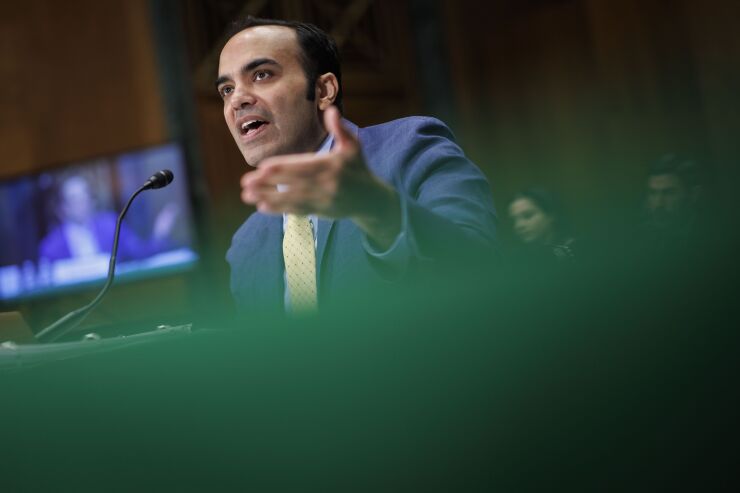
The organization
In a
"These issues are deeply troubling as the Appraisal Foundation is one of the most — if not the most — powerful players in America when it comes to appraisals and plays a controlling role in key issues contributing to appraisal bias," Chopra wrote. "As long as the Appraisal Foundation remains an insular body controlled by a small circle, operating behind closed doors, those issues will continue to go unaddressed."
Banks and other lenders rely on appraisals to ensure the
Dave Bunton, the president of the Appraisal Foundation, refuted Chopra's findings in a statement shared with American Banker on Tuesday.
"The Appraisal Foundation is committed to developing high quality standards and qualifications that uphold public trust in the appraisal profession," Bunton said. "We have always operated in a way that promotes transparency and an opportunity for all voices to give input on the standards and qualifications that impact appraisers and the public alike."
Chopra's letter summarizes his findings from a yearlong exploration of appraisal bias conducted by the Federal Financial Institutions Examination Council's Appraisal Subcommittee, an intergovernmental agency composed of the CFPB, the Federal Reserve, the Federal Deposit Insurance Corp., the Office of the Comptroller of the Currency, the National Credit Union Administration, the Department of Housing and Urban Development and the Federal Housing Finance Agency.
The subcommittee has held four hearings on appraisal bias, during which it has interviewed industry participants, academics and regulatory officials — including leaders from the Appraisal Foundation.
"Throughout those hearings, the witness testimonies point to an insular and contorted governance structure that all but guarantees that the profession and practices remain out of tune with the needs of [the] housing market, and much less likely to address appraisal bias," Chopra wrote.
Following one of the hearings last summer, Chopra
The foundation was granted rulemaking authority over the appraisal profession in 1989 by the Financial Institutions Reform, Recovery, and Enforcement Act, or FIRREA — one of several pieces of legislation passed in the wake of the savings and loan crisis. It does this by issuing the Uniform Standards of Professional Appraisal Practice, or USPAP, which then inform state-level licensing and regulatory policies.
Appraisal professionals must pay for USPAP materials. Fees from these sales and licensed rights for related educational programs and materials fund the foundation.
In his letter, Chopra noted that the officials that set these standards and those that serve on the foundation's board of trustees are selected through a nontransparent process — one that has, at times, been influenced by a "pay-to-play" mechanism that gives special nominating priority to paying sponsors or "partners."
The CFPB director also raised issues with the foundation's standards for avoiding conflicts of interest, drawing a sharp line between its code of conduct and that of the federal government.
"The Standards of Ethical Conduct applicable to executive branch employees are 77 pages. The Appraisal Foundation's conflict of interest policies are each under two pages. The code of conduct is four," Chopra wrote. "Unsurprisingly, there are substantial differences in the policies."
The letter made no specific recommendations for how the foundation or the oversight of it should be changed.
In his response statement, Bunton — who is set to retire from the foundation after more than 30 years at the helm — said the past few years have been an "incredibly transformative time" for the organization. He said it has tackled the issue of bias in appraisal "head-on" and taken a hard look at its internal policies and practices.
"I am disappointed that a hearing on appraisal bias turned to personal attacks rather than exploring opportunities to collaborate on this critical issue," Bunton said. "Appraisal bias is a serious matter that requires our combined efforts, and I look forward to working with the Appraisal Subcommittee to root out discrimination and build public trust in the appraisal profession."






